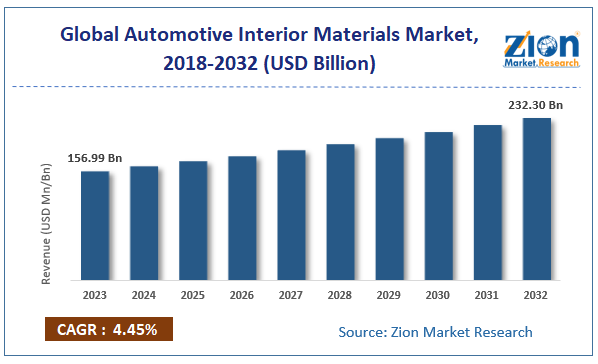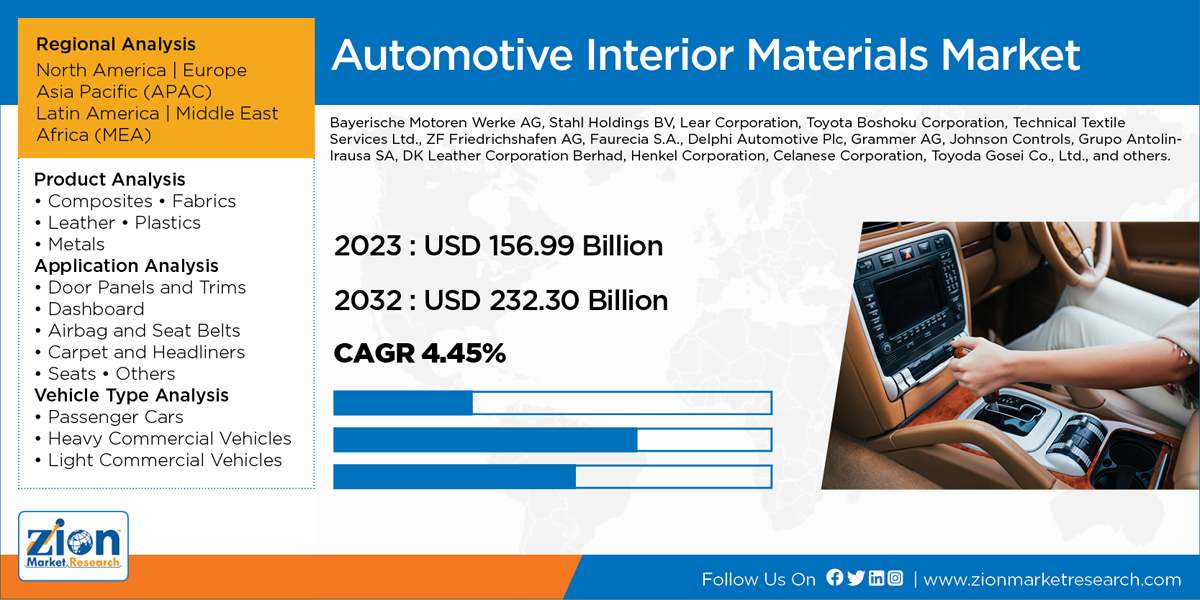Automotive Interior Materials Market Size, Share, Global Trends Report, 2032

Automotive Interior Materials Market by Product (Plastics, Composites, Leather, Fabrics, and Metals), by Application (Dashboard, Airbag and Seat Belts, Seats, Door Panels and Trims, Carpet and Headliners, and Others), and by Vehicle Type (Passenger Cars, Heavy Commercial Vehicles, and Light Commercial Vehicles): Global Industry Perspective, Comprehensive Analysis, and Forecast, 2024 - 2032
| Market Size in 2023 | Market Forecast in 2032 | CAGR (in %) | Base Year |
|---|---|---|---|
| USD 156.99 Billion | USD 232.30 Billion | 4.45% | 2023 |
Automotive Interior Materials Industry Prospective:
The global automotive interior materials market size was worth around USD 156.99 billion in 2023 and is predicted to grow to around USD 232.30 billion by 2032 with a compound annual growth rate (CAGR) of roughly 4.45% between 2024 and 2032.
Automotive interior materials are a significant part of an automobile, as they enhance the ambiance of a vehicle, offer driving pleasure and maximize the comfort to drivers as well as passengers. These materials are a significant part of an automobile, as they enhance the ambiance of a vehicle, offer driving pleasure and maximize the comfort to drivers as well as passengers. Moreover, they are often light and soft, yet strong to provide protection during road accidents. Efficient interior materials help reduce the engine vibrations inside the car, minimize fatigue, and provide good cabin insulation. In addition to this, these interiors are meant to offer comfort to the drivers as well as passengers. Earlier, high-grade interiors were only found in luxury vehicles, but these days, even mid-sized cars that are cost-effective feature premium interiors. Thus, manufacturers are discovering various cost-effective technologies related to interior materials for their utilization in mid-sized, budget cars.
Rising demand for passenger vehicles and its rapid demand across the globe are anticipated to drive the automotive interior materials market in the years ahead. For instance, the global passenger cars production was over 72 million units in 2023, i.e., approximately 5% more than the growth recorded. Rising demand for premium vehicle interiors is further anticipated to boost this market in the years to come. Consumers constantly demand high-grade interior designs with high-class tactile experience even for their economic, mid-sized cars. Furthermore, rapid economic expansion witnessed globally and innovative automotive designs are likely to offer lucrative opportunities to the market players in the forthcoming years.
The report provides a company market share analysis to give a broader overview of the key players in the market. In addition, the report also covers key strategic developments of the market including acquisitions & mergers, new product launches, agreements, partnerships, collaborations & joint ventures, research & development, and product and regional expansion of major participants involved in the market on a global and regional basis. Moreover, the study covers price trend analysis and material portfolio of various companies according to the regions.
The study provides a decisive view of the automotive interior materials market by segmenting the market based on product, vehicle type, application, and region. All the segments have been analyzed based on present and future trends and the market is estimated from 2024 to 2032.
By product type, the automotive interior materials market is segmented into composites, fabrics, leather, plastics, and metals. Based on the application, the automotive interior materials market is categorized into door panels and trims, dashboards, airbags, and seat belts, carpets and headliners, seats, and others. On the basis of vehicle type, the automotive interior materials market is classified into passenger cars, heavy commercial vehicles, and light commercial vehicles.
Automotive Interior Materials Market: Report Scope
| Report Attributes | Report Details |
|---|---|
| Report Name | Automotive Interior Materials Market |
| Market Size in 2023 | USD 156.99 Billion |
| Market Forecast in 2032 | USD 232.30 Billion |
| Growth Rate | CAGR of 4.45% |
| Number of Pages | 220 |
| Key Companies Covered | Bayerische Motoren Werke AG, Stahl Holdings BV, Lear Corporation, Toyota Boshoku Corporation, Technical Textile Services Ltd., ZF Friedrichshafen AG, Faurecia S.A., Delphi Automotive Plc, Grammer AG, Johnson Controls, Grupo Antolin-Irausa SA, DK Leather Corporation Berhad, Henkel Corporation, Celanese Corporation, Toyoda Gosei Co., Ltd., and others. |
| Segments Covered | By Product, By Application, By Vehicle Type, and By Region |
| Regions Covered | North America, Europe, Asia Pacific (APAC), Latin America, The Middle East and Africa (MEA) |
| Base Year | 2023 |
| Historical Year | 2018 to 2022 |
| Forecast Year | 2024 - 2032 |
| Customization Scope | Avail customized purchase options to meet your exact research needs. Request For Customization |
The regional segmentation includes the historic and forecast demand for North America, Europe, Asia Pacific, Latin America, and the Middle East and Africa. This segmentation includes the demand for the automotive interior materials market based on all segments in all regions and countries.
In 2023, Asia Pacific held a major automotive interior materials market share, both in terms of revenue and volume. The region is anticipated to continue its dominance during the forecast timeframe as well, due to the increasing use of automotive interior materials for different vehicle types in emerging countries, such as India and China. This is due to the increasing need to own cars, growing demand for automotive materials in passenger cars, and improving living standards of people.
Automotive Interior Materials Market: Competitive Analysis
The global automotive interior materials market is dominated by players like:
- Bayerische Motoren Werke AG
- Stahl Holdings BV
- Lear Corporation
- Toyota Boshoku Corporation
- Technical Textile Services Ltd.
- ZF Friedrichshafen AG
- Faurecia S.A.
- Delphi Automotive Plc
- Grammer AG
- Johnson Controls
- Grupo Antolin-Irausa SA
- DK Leather Corporation Berhad
- Henkel Corporation
- Celanese Corporation
- Toyoda Gosei Co., Ltd.
This report segments the global automotive interior materials market as follows:
Global Automotive Interior Materials Market: Product Analysis
Global Automotive Interior Materials Market: Application Analysis
- Door Panels and Trims
- Dashboard
- Airbag and Seat Belts
- Carpet and Headliners
- Seats
- Others
Global Automotive Interior Materials Market: Vehicle Type Analysis
- Passenger Cars
- Heavy Commercial Vehicles
- Light Commercial Vehicles
Global Automotive Interior Materials Market: Regional Analysis
- North America
- The U.S.
- Europe
- UK
- France
- Germany
- Asia Pacific
- China
- Japan
- India
- Latin America
- Brazil
- Middle East and Africa
Table Of Content
Methodology
FrequentlyAsked Questions
Automotive interior materials are a significant part of an automobile, as they enhance the ambiance of a vehicle, offer driving pleasure, and maximize the comfort of drivers as well as passengers.
According to a study, the global automotive interior materials market size was worth around USD 156.99 billion in 2023 and is expected to reach USD 232.30 billion by 2032.
The global automotive interior materials market is expected to grow at a CAGR of 4.45% during the forecast period.
Asia Pacific is expected to dominate the automotive interior materials market over the forecast period.
Leading players in the global automotive interior materials market include Bayerische Motoren Werke AG, Stahl Holdings BV, Lear Corporation, Toyota Boshoku Corporation, Technical Textile Services Ltd., ZF Friedrichshafen AG, Faurecia S.A., Delphi Automotive Plc, Grammer AG, Johnson Controls, Grupo Antolin-Irausa SA, DK Leather Corporation Berhad, Henkel Corporation, Celanese Corporation, and Toyoda Gosei Co., Ltd., among others.
The automotive interior materials market report covers the geographical market along with a comprehensive competitive landscape analysis. It also includes cash flow analysis, profit ratio analysis, market basket analysis, market attractiveness analysis, sentiment analysis, PESTLE analysis, trend analysis, SWOT analysis, trade area analysis, demand & supply analysis, Porter’s five forces analysis, and value chain analysis.
Choose License Type
RelatedNews
HappyClients
Zion Market Research
Tel: +1 (302) 444-0166
USA/Canada Toll Free No.+1 (855) 465-4651
3rd Floor,
Mrunal Paradise, Opp Maharaja Hotel,
Pimple Gurav, Pune 411061,
Maharashtra, India
Phone No +91 7768 006 007, +91 7768 006 008
US OFFICE NO +1 (302) 444-0166
US/CAN TOLL FREE +1 (855) 465-4651
Email: sales@zionmarketresearch.com
We have secured system to process your transaction.
Our support available to help you 24 hours a day, five days a week.
Monday - Friday: 9AM - 6PM
Saturday - Sunday: Closed







